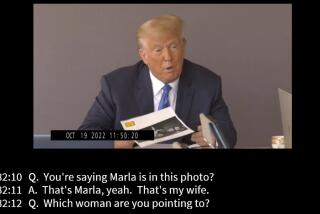Tribunal Issues Video of Hussein
- Share via
BAGHDAD — The special tribunal that will try Saddam Hussein for war crimes released a video Monday of the deposed Iraqi president being questioned.
The footage showed a bearded Hussein wearing a dark suit and open-collared white shirt and speaking with the lead judge of the Iraqi Special Tribunal, Raid Juhi. There was no audio, so it was impossible to tell whether Hussein struck the same defiant and confrontational tone as in his taped arraignment in July 2004.
A statement accompanying the video said it showed Hussein being questioned about the 1982 massacre in the Shiite Muslim village of Dujail, about 50 miles north of Baghdad. Dozens of villagers were executed after Hussein escaped an assassination attempt during a visit there.
Juhi, when approached Monday evening at a heavily guarded reception for the new Egyptian ambassador, declined to comment on the video.
The statement did not say when the video was shot, but Badeea Arif, one of Hussein’s lawyers, told satellite television channel Al Arabiya that it appeared to have been filmed in the last 24 hours. Arif said his client’s health seemed to be “not good.”
It was unclear why the tribunal released the video. Unlike last summer’s arraignment, the questioning had little legal significance. Plus, the Dujail killings are dwarfed in scope by other counts Hussein is likely to face. Those include suppression of the 1991 uprisings in the Shiite south and Kurdish north, the systematic eradication of dozens of Kurdish villages and the 1990 occupation of neighboring Kuwait.
No start date for Hussein’s trial has been announced. Many Iraqi lawmakers have expressed an interest in fast-tracking the prosecution, even if it means skipping some of the more complicated charges that could take years to properly investigate. They hope a speedy trial would shore up public faith in the new U.S.-backed government, while dealing a lasting psychological blow to the insurgency.
Insurgents continued their violent campaign Monday with a series of scattered attacks in Baghdad and the north that killed 10 Iraqis and wounded at least 55.
A car bomber detonated his vehicle Monday afternoon outside the offices of the local district council in Baghdad’s Yarmouk neighborhood, killing a young girl, injuring five other Iraqi civilians and just missing a top American diplomat who had visited a nearby building.
Residents said the bomber was apparently targeting a U.S. convoy carrying soldiers who regularly attended the district council’s weekly meetings. The council offices are around the corner from the headquarters of the Iraqi Islamic Party, and party officials said the blast came minutes after U.S. Charge d’Affaires James F. Jeffrey had left a meeting at their offices.
A U.S. Embassy spokesman declined to comment on whether Jeffrey had visited the offices.
On the road from Baghdad north to Baqubah, insurgents armed with automatic weapons and rocket-propelled grenades attacked a police checkpoint, killing four officers and injuring four others. Reinforcements responding to the scene were then attacked by a car bomber, and another six officers were hurt.
In Tikrit, Hussein’s hometown, a car bomber targeted a police convoy, killing two high-ranking officers and injuring two others, along with 10 civilians. West of the northern city of Kirkuk, a car bomber targeted an Iraqi army checkpoint, injuring five Iraqi soldiers.
And in the restive city of Samarra north of Baghdad, a car bomber struck a house used as a temporary base by Iraqi soldiers. The attack touched off hours of running battles between insurgents and U.S. and Iraqi forces, who imposed a daytime curfew over large sections of the city. Iraqi army Capt. Laith Mohammed said three policemen were killed and seven wounded; 16 civilians were also injured.
Meanwhile, in Paris, speculation continued to swirl around whether a ransom had been paid to secure Sunday’s release of Florence Aubenas, a French journalist held captive in Iraq for five months.
Like their counterparts in Italy, Romania and other countries whose citizens have been abducted in Iraq, French officials insisted that no ransom had been paid.
In a interview in April, a high-ranking intelligence official in a western European country whose citizens have been released by Iraqi captors told the Los Angeles Times that insurgents were pressing the French for a large payment.
Speculation increased a few days ago when Robert Menard, the head of the Paris-based Reporters Without Borders, indicated that the kidnappers demanded $15 million in the weeks after Aubenas’ abduction in January. But after the French Foreign Ministry issued an emphatic denial, Menard retracted his comment.
Aubenas’ employer, the newspaper Liberation, concluded Monday that the public would never know if a ransom was paid.
*
Times staff writers Sebastian Rotella in Paris and Zainab Hussein in Baghdad, special correspondents Ali Windawi in Kirkuk and Zaydan Khalaf in Samarra and a special correspondent in Tikrit contributed to this report.
More to Read
Sign up for Essential California
The most important California stories and recommendations in your inbox every morning.
You may occasionally receive promotional content from the Los Angeles Times.













